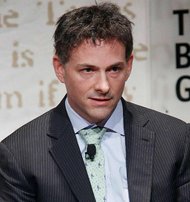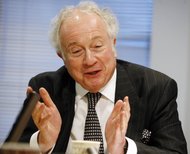 Carlo Allegri/ReutersDavid Einhorn, founder of the hedge fund Greenlight Capital.
Carlo Allegri/ReutersDavid Einhorn, founder of the hedge fund Greenlight Capital.
Martin Lipton, one of the nation’s top corporate lawyers, was dismayed.
Having watched David Einhorn, the activist investor, go to battle with Apple in the last two weeks to push it to distribute some of its $137 billion cash hoard to shareholders, Mr. Lipton had seen enough. Mr. Einhorn, he thought, had gone too far.
A longtime counselor to the Fortune 500 as one of the founding partners of Wachtell, Lipton, Rosen Katz, he sat down and wrote a scathing memo to his clients on his view that “shareholder democracy” has run amok.
DealBook Column
View all posts
“The activist-hedge-fund attack on Apple — in which one of the most successful, long-term-visionary companies of all time is being told by a money manager that Apple is doing things all wrong and should focus on short-term return of cash — is a clarion call for effective action to deal with the misuse of shareholder power,” he wrote. The memo was entitled, “Bite the Apple; Poison the Apple; Paralyze the Company; Wreck the Economy.”
 Keith Bedford/ReutersMartin Lipton, founding partner of Wachtell, Lipton, Rosen and Katz.
Keith Bedford/ReutersMartin Lipton, founding partner of Wachtell, Lipton, Rosen and Katz.
Mr. Lipton said that long-term shareholders in public companies are being undermined “by a gaggle of activist hedge funds who troll through S.E.C. filings looking for opportunities to demand a change in a company’s strategy or portfolio that will create a short-term profit without regard to the impact on the company’s long-term prospects.”
While “shareholder democracy” may be a good sound bite, Mr. Lipton has a point worth considering.
It increasingly appears that the rise of “shareholder democracy” is leading, in some cases, to a perverse game in which so-called activist investors take to the media to pump or dump stocks in hopes of creating a fleeting rise or fall in a company’s stock price. The battle over Apple is just one minor example. Carl Icahn’s investment in Herbalife, betting against William Ackman’s accusation that the company is a “pyramid scheme,” is another.
That’s not to say that shareholder democracy is a bad thing. Shareholders have successfully and properly brought pressure to bear on underperforming companies, pushed out entrenched directors and, in some cases, pressed for operational changes to address health and the environment.
At a time when investors are calling for managements and directors to think more about the long term, this latest breed of activism is also multiplying. But are these activists interested in the long term?
According to Leo E. Strine Jr., the chief judge of the Delaware Court of Chancery, the answer is usually obvious: no.
“Many activist investors hold their stock for a very short period of time and may have the potential to reap profits based on short-term trading strategies that arbitrage corporate policies,” he wrote in a widely circulated essay for the American Bar Association. Near the beginning of his essay he asked: “Why should we expect corporations to chart a sound long-term course of economic growth, if the so-called investors who determine the fate of their managers do not themselves act or think with the long term in mind?”
The academic literature provides a mixed and inconclusive assessment of the true effect of activism on shareholder value over the long-term.
In fairness, it must be said that not all activist investors are created equal and not all of their investments should be considered in the same way. Nelson Peltz, once called a corporate raider, fought his way onto the board of Heinz in 2006. He is still on the board and approved the sale of the company to Berkshire Hathaway and 3G Capital just weeks ago.
Daniel Loeb, the founder of Third Point Management, similarly fought his way onto the board of Yahoo after exposing its former chief executive, Scott Thomson, for lying on his résumé. He is now a board member and helped recruit Marissa Mayer to be chief executive. Whether he likes it or not, Mr. Loeb is a long-term shareholder in Yahoo. Just weeks ago, however, he announced that he had made an investment in Herbalife that his peer, Mr. Ackman, is betting against. Part of Mr. Loeb’s bet was simply a short-term gamble; he has since sold some of his investment, taking profits off the table.
Similarly, Mr. Ackman has made some long-term bets — he held his short position in MBIA for years and is now a long-term investor and director of J. C. Penney — but he has also made a series of short-term investments as well.
As for Mr. Einhorn’s fight with Apple, it is hard to argue he is a short-term investor in the company; his firm, Greenlight Capital, has held a stake for the past three years. But the measures he is pressing the company to pursue — creating a “iPref” or preferred share that pays a dividend to shareholders in perpetuity — feel a lot like financial engineering to create some quick value for investors.
In a news release announcing his proposal, which would have Apple create $50 billion in perpetual preferred stock, Mr. Einhorn said that amount of the new shares “would unlock about $30 billion, or $32 per share in value. Greenlight believes that Apple has the capacity to ultimately distribute several hundred billion dollars of preferred, which would unlock hundreds of dollars of value per share.” He continued, “Greenlight believes additional value may be realized when Apple’s price-to-earnings multiple expands, as the market appreciates a more shareholder-friendly capital allocation policy.”
In truth, Mr. Einhorn’s proposal is a lot more long-term thinking than just pressing Apple to distribute a special one-time dividend or pursue a series of stock buybacks; his proposal requires shareholders to remain so as to reap the dividends the special “iPrefs” would throw off. But make no mistake, Mr. Einhorn is also hoping that Apple’s common shares will jump in price if Apple takes up his proposal.
Mr. Einhorn declined to comment for this column.
I’ve had my own run-ins with Mr. Lipton. In 2008, before the financial crisis, I wrote a column questioning Mr. Lipton’s various efforts “to stiff-arm the people who actually own the company.” At the time, he wrote a memo arguing that the “limits on executive compensation, splitting the role of chairman and C.E.O. and efforts to impose shareholder referendums on matters that have been the province of boards should be resisted.”
As the inventor of the anti-takeover maneuver called the “poison pill” and as one who has made a career trying to protect boards from agitators, Mr. Lipton was talking his own book. I wrote, “Mr. Lipton’s advice isn’t just wrongheaded. It’s dangerous.”
But nearly five years later, with the perspective of the financial crisis, Mr. Lipton’s underlying worry that certain shareholders will abuse the powers of democracy is not unfounded. The question, as is often the case, is whether the influence of a few interested in the short term overwhelms the best interests of the many in the long term.
A version of this article appeared in print on 02/26/2013, on page B1 of the NewYork edition with the headline: ‘Shareholder Democracy’
Can Mask
Abuses.
Article source: http://dealbook.nytimes.com/2013/02/25/shareholder-democracy-can-mask-abuses/?partner=rss&emc=rss
